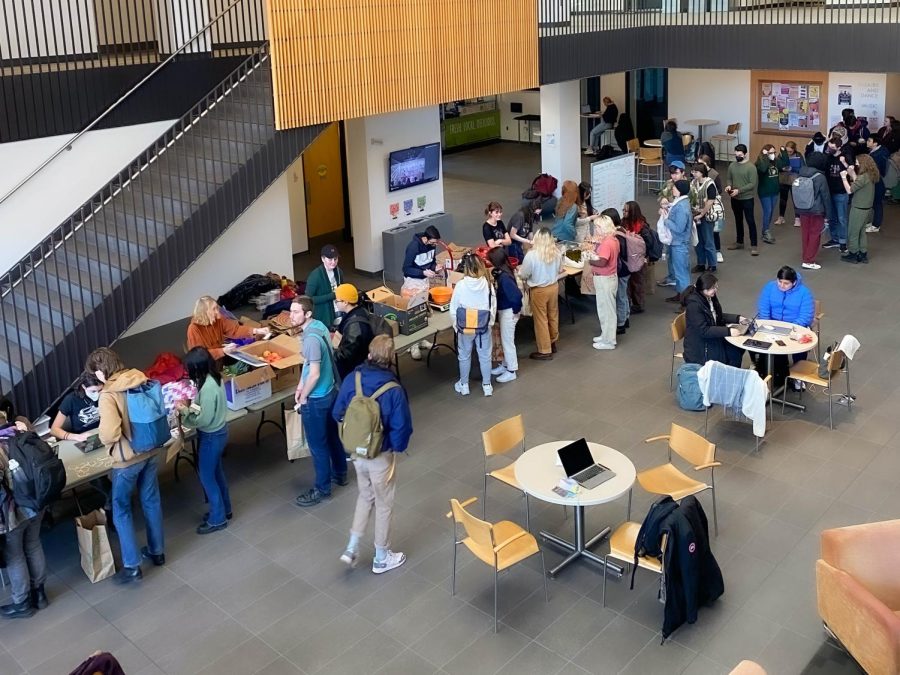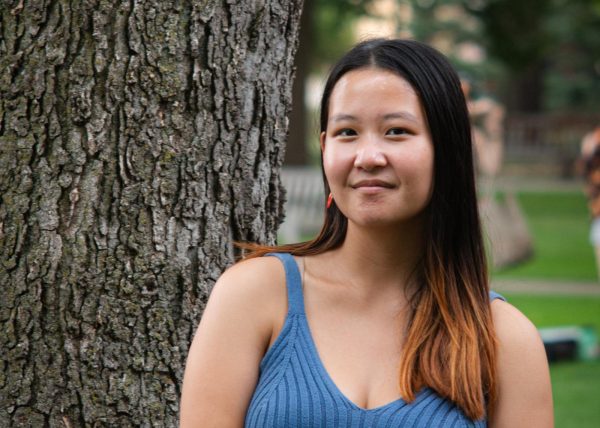MacShare investigates origins, emphasizes community partnerships
April 20, 2023
When egg prices shot up due to an avian flu outbreak in the past year, MacShare stepped in to fill the need for eggs in the Macalester community, especially for students operating on a tight budget. With prices increasing up to $7 per dozen, the $2.10 price on MacShare eggs was especially appealing, and the org received interest in over 300 dozen eggs from almost 200 people when they opened an interest form in the Mac Daily.
The eggs sold at MacShare sales are purchased from smaller Mennonite farmers in Iowa through a co-op called The Good Acre, which has allowed them to keep the prices low. These farmers weren’t hit by the same bird influenza outbreak as factory farmers, thus avoiding the sharp supply drop.
“We realized this is something college students really like and need, especially during this time,” Tala Tabishat ’23, one of the co-leaders of MacShare said. “That’s when our lines started and we really started gaining more people.”
Prior to the egg price spike, MacShare averaged 30-40 people per sale, held each week on Fridays from 3:30-5:00 p.m. Now, sales have increased to around 80-120 people per sale, almost triple the previous number.
“The spiked interest has allowed us to do more of our community engagement [and] mutual aid efforts that we try to do,” Tabishat said. “Because we have more people we’ve been able to do more donations and we’ve been hosting more fundraising efforts.”
These fundraisers have allowed for supporting efforts in Ukraine, Syria, Turkey and the Twin Cities’ own East Phillips neighborhood. Their current campaign works towards funding Feeding Frogtown, and they want to be able to help the Macalester community learn about organizations similar to MacShare and how they grow.
“An aspect of MacShare that we do really well is that in our roundup campaigns we bring in non-profit organizations from the Twin Cities,” Jane Dawson ’25, MacShare co-leader, said. “It’s an opportunity for students to learn a little bit more about what’s going on in the community in regards to food justice and environmental justice.”
The opportunity to volunteer and engage with causes is a significant part of why MacShare members work with the club.
“I am really big on affordable food because it is very sustainable, not only for the environment but also for the economy and for the welfare of people,” Sydney Jones ’23 said.
As MacShare has grown in popularity, its members have become more curious about the org’s origins. At a zoom meeting on April 5, interested MacShare members had the opportunity to speak to founders of the org, Millie Maureen ’18 and Elston Adelaide ’19, and learn more about how MacShare functioned in the past.
“[MacShare] started as a class project, and some of the students went to a conference about having co-ops on campuses,” Tabishat said. “That’s something we’re looking into possibly doing in the future, sending students there again.
The conference attended was hosted by the Cooperative Food Empowerment Directive (CoFED), which is a QTBIPOC led organization that works towards building food and land co-ops. The subject was the creation of anti-racist economies on college campuses, something that the founders of MacShare were attempting to do and something that current MacShare members still aspire to.
“[The sale] sort of started out of a project I did in a [social entrepreneurship] class,” Adelaide said. “I took a job in the sustainability office and through that, we started actually doing our first sales.”
At the start, the sales were difficult to run and arrange. Acquiring storage and fridge space for the items that were being brought in as well as utility tools such as scales and funnels was difficult.
“I guess we just really went ham on asking people if we could have their closet,” Maureen said. “I would have loved for it to have looked more like a store.”
MacShare activity declined during the pandemic, and at the start of the 2021-2022 academic year, the foundation of MacShare had dwindled down to three people. Since then, people have joined the org and chosen to volunteer their time for a variety of reasons, such as cheap produce, dietary restrictions, and the lack of an affordable grocery store within walking distance to campus.
“As far as our mission, this is a political project as well as being a way for people to get food, those things are so inextricably intertwined, it’s really messed up that there’s no good way to get food on campus” Adelaide said. “Macalester has a lot of buying power, so [we want to] shift the money that we’re putting into food away from Whole Foods and Kowalski’s and into local farms.”
Despite their intentions, MacShare found it difficult to battle Bon Appétit as they began their sales.
“I worked with them for a year and they would just say yes to [sustainability] projects and not put any support behind it,” Maureen said.
Currently MacShare collaborates with Bon Appétit in regard to food recovery, but with the campus’ food provider monopolizing over half of the student body with the required meal plan, this can be especially difficult. Furthermore, the period of time when the Sustainability Office was between directors as former director Christie Manning returned to teaching in the psychology department and new director Megan Butler came into the position caused a rough transition period.
“As we’ve been trying to build the mission back up, we’ve tried to create a checklist of sustainability in terms of what we choose and how we prioritize,” Tabishat said.
Overall, MacShare is about community, and a way to bring the Macalester community together in a sustainable way that promotes group action and shared goals.
“It’s great to have the Macalester community all trying to get access to sustainable food,” Em Aiydarus ’25 said. “It’s a lovely way to support each other and support a good cause.”
*Noah Riccardi contributed to the reporting for this story.














